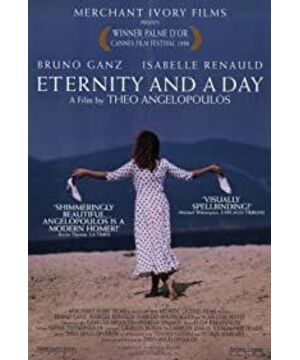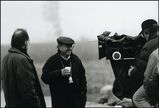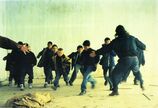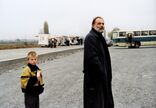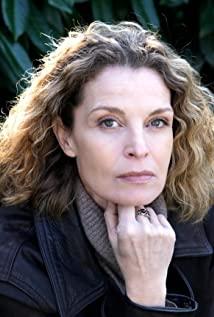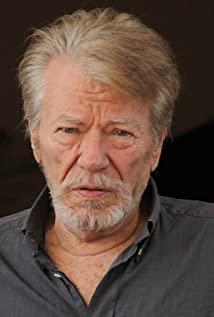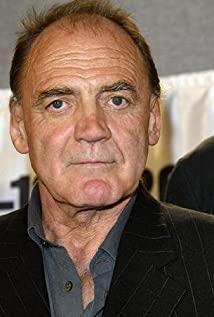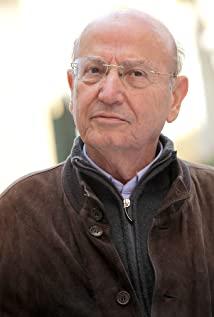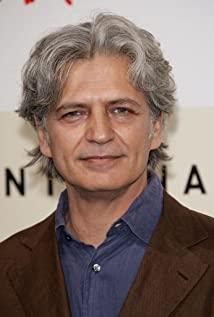Hometown, as the end of life's journey, guides us into tomorrow. We once again set foot on the wandering homecoming.
Watching the film for the second time, many hazy questions have become clear: this is a story of returning from death and oblivion, of taking a day back from eternity, of returning home. We accompany the protagonist Alexander on the journey of the last day of his life. This day is like a slow, moving long shot. When we fully absorb the content of the way with the traveler, we will also like him, we will turn back before the end. .
The film begins with Alexander saying goodbye to Orania, who took care of him for three years. Whoever used music to reconcile with him, this puzzle could not save him, and he was tormented by illness and discouragement, and he would end his life the next day. After a long stroll along the river, the protagonist walks out of the camera, leaving a void. Above this void, three threads are braided like a braid, and there are loose and beautiful intersections: the ancient poet who returned to his native Greece from Italy, the letter written by Alexander's wife, the experience of the Albanian boy.
The famous writer Alexander became fascinated by a nineteenth-century Greek poet who had lived in Italy for a long time and returned when the revolution started in his homeland to praise his fellow countrymen who had risen up in a strange mother tongue. He buys words from people until he leaves a fragment of words. When Alexander told the story to the boy, the camera panned forward from the water behind them and met the poet at the water's edge; the poet was mulling words in the stone castle until Alexander and the boy walked in, and the camera showed the sky above the stone castle. It turned out that it was already weathered and abandoned. The ancient poet returned to his hometown as a foreign land, and painstakingly acquired his mother tongue as a foreign language. A nostalgic feeling even though he was near and far, he seemed to be in the same time and space as Alexander under the connection of the camera.
Alexander's wife left some letters. On one of her supposedly blissful days, she woke up sad and weeping, and then spent the rest of the day laughing with friends and relatives, feeling the absence of her husband, who must have been searching for words just like the ancient poet. , Thinking about the danger of the nation, he climbed the cliff away from the crowd, intoxicated by his own thoughts. "I want to kidnap you between your books...you're not with us," she thought desperately. After reading these letters, the day Alexander had spent became the day he had just been discovered. His wife's despair, along with her death, had become a thing of the past, but it was a secret that he only discovered now. He kept going back in time, back to a day so familiar, yet so unfamiliar.
The ancient poet, Alexander, the little boy in Albania, they were all "strangers" - this is the word the little boy found for Alexander. The ancient poet felt the call of his hometown only when he was in a foreign land. After returning, he faced the dilemma of language and fell into a fatal "word poverty"; the writer Alexander, who resonated with him, devoted himself to finding lost words from the very beginning, but this sense of mission made him become a poet. The wanderer in his life made him unable to be intimate with his wife, and she struggled to retain it and regretted: "I know you will leave one day... Just give me this day as if it were our last day!" Alexander Asking himself at his mother's bedside: "Why did I exile my wife?" If the pain of the ancient poet was that he was always a foreigner to his homeland, the pain of Alexander was that he was obsessed with the mission of writing and unknowingly stayed away from it. love in life. The so-called "poor words" is not only the predicament of language, but also the predicament of life, the inability to speak love. They can only find their hometown in a foreign land, and they can find their love after the death of their love. There is an insurmountable distance between them and their motherland and lover. How do people return to their hometown and how do they truly love? Alexander interrupts the wedding as the dying man - a symbol of the beginning of a new life. He handed over the dog to Orania and decided to end the fate of wandering forever.
However, he met a young boy from Albania. The boy came to Greece to escape the war in his homeland, and he and other stowaways cleaned car windows on the street to make a living. He was rescued by Alexander when he was rounded up by the police, and later nearly abducted by human traffickers, Alexander rescued him again. "Wandering birds wailed in a foreign land," the boy hummed, and Alexander found himself and the words he was looking for in him. Rich people who bought refugees designated "orders" in English, the grid at the national border was full of scorched corpses of failed smuggling, a group of soldiers walked into roadside restaurants, protesting students boarded trams with red flags in their hands... Decline, crisis and confusion The smell is in the air. Time and time again, Alexander arranged for the little boy to get into the car bound for the border. Even if the little boy refused again and again, he even personally sent the boy to the edge of the border, insisting on letting him return to his hometown.
At the white border, Alexander got out of the car and raised his head. He covered his face, and the little boy also got out of the car and began to narrate the past of crossing the minefield. The camera swings up from the white snow, like sweeping the twisted hieroglyphs on the scroll, and slowly sweeps the corpses that Alexander saw and failed to smuggle. There is no clearer exile. The car block at the junction slowly rose, the guard's image was as blurred as the world on the "hometown" side, and the tallest one came towards them... They turned around and fled.
Is that place where war is raging and there are no relatives and friends, is it really home? When the little boy burned the relics of his friend Sellin, all the stray children gathered around the fire, and one child said, "Oh, Sellin, talk about the world!" If so, why did they try to escape, why did they talk about it With all the ports and the vast world, why did the little boy refuse and choose to return to a stranger again and again? Could those unknown ports and worlds be exiles that must be passed before discovering the true "homeland", like the Greek poet who returned from Italy, like Alexander who read his wife's letters?
"You will... embark on a journey. Travel all over the port, travel the world." The little boy who was about to leave by boat was about to start a journey, and Alexander's journey was coming to an end. "You are leaving too, I will be alone." At the moment when the two exiles were about to part, when the beginning and the end were about to be clearly delivered, Alexander suddenly shouted: "Stay with me!"
The movie then completely changed. "I was terrified." "Me too." Two homeless men hugged in the street on the last night of his life, two hours before he left by boat, a bus showed up, As if providing them with a shelter in the vast space and time, a shelter against wandering and death, three cyclists in yellow raincoats fill the empty lens with a melody. When Alexander and the boy happily got into the car and laughed carefree, I laughed too, shedding a tiny tear. I see this encounter as an amnesty during exile, as an accidental soul-possession in a long dislocation, two wanderers temporarily relieved from solitary servitude in the shadow of each other.
An accidental band played a variation of the film's main theme for them, and the music that appeared almost at the end was as joyous as a new beginning. Alexander and the little boy faced us and listened, as if absorbed and amazed not only by the music but by everything in front of them, at the sudden generosity of fate. The ancient poet got into the car and recited:
"The last stars before dawn signal the coming of the rising sun. Neither the fog nor the shadows can defile the cloudless sky. The breeze soothes all beings, like a prelude from the depths of the heart. Life is sweet. . . Life is so sweet."
The encounter did not change their respective wandering fates. But where does the new energy come from? Maybe, from "me too", from "life is so sweet". The last word that the boy sold to Alexander before he left: "late night". Did the late night of their separation, the last late night of his life, signal the "coming of the rising sun"? Alexander watched the ship leave, and then his car stopped at the traffic light for a long time, so long that we didn't know if he would start again, the face facing us was sad and hopeless. "Tell me, how long is tomorrow?" The poet gave him no answer. The camera cuts to the back of the car, the night sky has turned into dawn, the starting car spit out a white steam, and the car drove straight ahead.
He stood in the old house, and the camera was like a nostalgic hand, stroking the four walls of the house. "I write to you by the sea, over and over... One day, when you remember this day, remember, I'm staring, stroking my hands, here, waiting for you. Give me this day."
The door of the balcony was open, the mother was rocking his daughter's little cradle, the pavilion of the past was broken, the cross-shaped road was still there, the singing white-dressed relatives and friends were still there, his wife was there, calling his name. Just as the ancient poet who bought words recalls his hometown in his native language, the wife's letter finally recalls him to the day, the day that has passed, the day he has just entered. "How long is tomorrow?" "One more day than eternity." The day of lost love came on the last night when he was chased by death, from which he was gifted tomorrow, a new life.
On the crossroads they dance. Alexander said: I will not go to the hospital, strangers will respond to me with music, and someone will sell me new words. The wandering will continue, and the homecoming promises that in the future, on the path paved by words, the strangers will embark on the homecoming and go to tomorrow. Facing the sea, he read out the words the boy sold him: "little flower", "me", "foreigner", "late night"...
"Alexander!" was the mother's call. He came back, went to the sea with his playmates at the beginning of the film, and explored the ancient city under the sea. In words, letters and poems, childhoods spent, loved ones lost, and homes left come to the surface, just like the ancient city of centuries ago, the past as the future, as the dawn, and the hometown as life The end of the journey leads us to tomorrow. We once again set foot on the wandering homecoming.
View more about Eternity and a Day reviews


